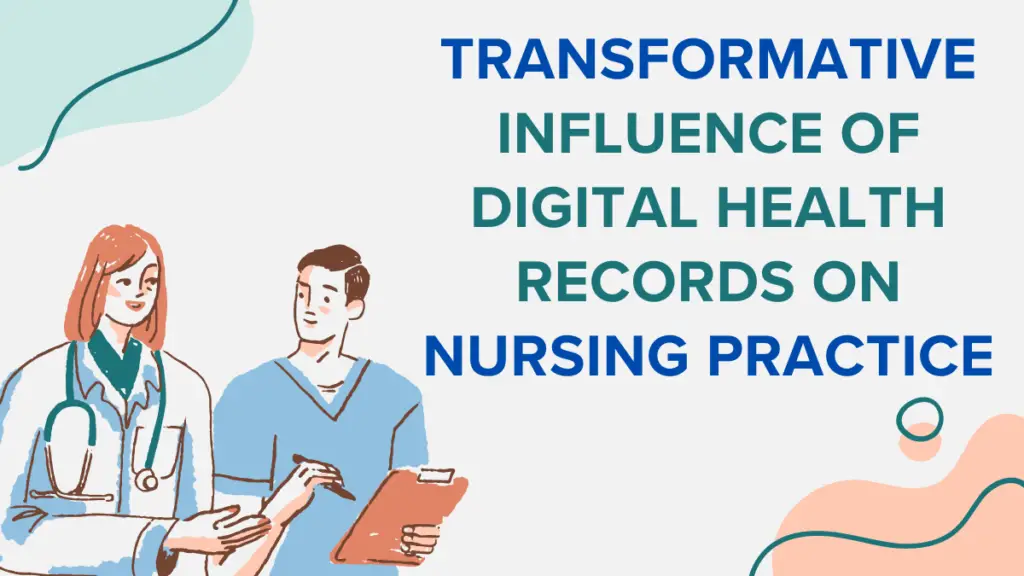In the fast-paced realm of healthcare, the adoption of digital health records (DHRs) has been nothing short of revolutionary, particularly in nursing practice. Digital health records, also known as electronic health records (EHRs), encompass digital versions of patients’ medical histories, treatments, diagnoses, medications, and more. This article delves into the profound impact of DHRs on nursing practice, elucidating how these technological advancements have reshaped workflows, improved patient care, and elevated the nursing profession as a whole.
Understanding Digital Health Records
Digital health records encapsulate a comprehensive repository of patient information, accessible electronically by authorized healthcare providers. These records streamline data management, replacing traditional paper-based systems with efficient digital interfaces. Within the context of nursing practice, DHRs serve as dynamic tools, empowering nurses with instant access to critical patient data, facilitating informed decision-making, and enhancing care coordination.
Table: Benefits of Digital Health Records in Nursing Practice
| Benefits | Description |
|---|---|
| Enhanced Efficiency | Streamlined workflows, reduced administrative burden, and increased productivity. |
| Improved Patient Safety | Medication reconciliation, allergy alerts, and clinical decision support systems for error prevention. |
| Facilitated Interdisciplinary Communication | Real-time data sharing, collaboration, and care coordination among healthcare teams. |
| Data-Driven Insights | Actionable intelligence from analytics to inform evidence-based practice and quality improvement. |
| Empowerment of Nursing Professionals | Enhanced patient-centered care, personalized interventions, and documentation efficiency. |
Enhanced Efficiency and Workflow Optimization
One of the primary benefits of DHRs in nursing practice lies in their ability to optimize workflows and streamline administrative tasks. With digital documentation, nurses can efficiently record patient information, update charts in real-time, and communicate seamlessly with interdisciplinary teams. This efficiency translates into more time spent on direct patient care, reducing administrative burdens and enhancing overall productivity within healthcare settings.
Improved Patient Safety and Outcomes
The integration of DHRs in nursing practice has significantly bolstered patient safety initiatives and contributed to improved clinical outcomes. Through features such as medication reconciliation, allergy alerts, and clinical decision support systems, DHRs enable nurses to mitigate medication errors, identify potential adverse reactions, and provide evidence-based care. Furthermore, the accessibility of comprehensive patient data empowers nurses to proactively address health concerns, prevent complications, and optimize treatment plans, ultimately enhancing patient well-being and reducing the likelihood of adverse events.
Facilitated Interdisciplinary Communication and Collaboration
Effective communication and collaboration are paramount in healthcare delivery, and DHRs serve as catalysts for interdisciplinary synergy. Nurses can utilize DHR platforms to share vital patient information with physicians, pharmacists, therapists, and other healthcare professionals in real-time. This seamless exchange of data fosters collaboration, promotes care continuity, and ensures that all members of the healthcare team are aligned in their approach to patient management. By breaking down silos and facilitating interprofessional communication, DHRs enhance care coordination and contribute to holistic patient care delivery.
Data-Driven Insights and Evidence-Based Practice
In the era of big data, DHRs offer a treasure trove of valuable insights that can inform nursing practice and drive evidence-based care. Through data analytics and reporting functionalities, nurses can glean actionable intelligence from DHR repositories, identifying trends, patterns, and areas for quality improvement. By leveraging these data-driven insights, nurses can tailor interventions, implement best practices, and optimize care protocols to align with patient needs and clinical outcomes.
Empowerment of Nursing Professionals
Digital health records have empowered nursing professionals by equipping them with the tools and resources needed to deliver high-quality, patient-centered care. With DHR platforms at their fingertips, nurses possess a comprehensive view of each patient’s medical history, preferences, and care plans, enabling them to personalize care delivery and cultivate therapeutic relationships. Moreover, DHRs facilitate nursing documentation, ensuring compliance with regulatory standards and enabling nurses to focus their attention on clinical assessment and intervention.
Challenges and Considerations
While the integration of DHRs in nursing practice offers myriad benefits, it also presents certain challenges and considerations. Issues such as user interface design, interoperability, data security, and user training require careful attention to ensure optimal utilization and minimize potential risks. Moreover, the digitization of health records necessitates ongoing adaptation and proficiency development among nursing professionals, highlighting the importance of robust training programs and continuous education initiatives.
Conclusion
In conclusion, the advent of digital health records has ushered in a new era of possibilities for nursing practice, catalyzing advancements in efficiency, safety, collaboration, and evidence-based care. By harnessing the power of technology, nurses can elevate the quality of patient care, optimize clinical workflows, and fulfill their pivotal role within interdisciplinary healthcare teams. Moving forward, it is imperative that nursing professionals embrace the transformative potential of DHRs, leveraging these innovative tools to uphold the highest standards of excellence and integrity in patient care delivery.

